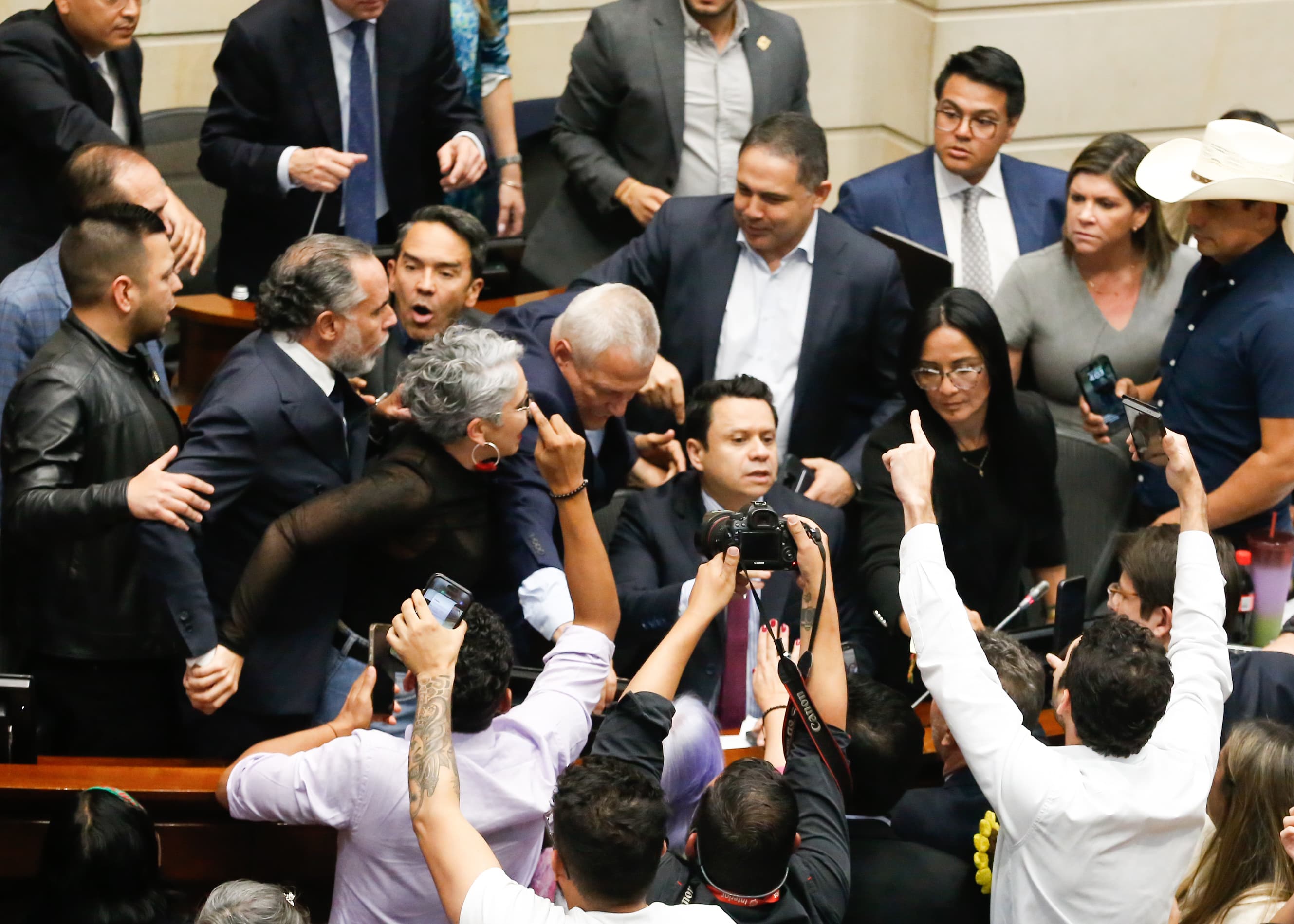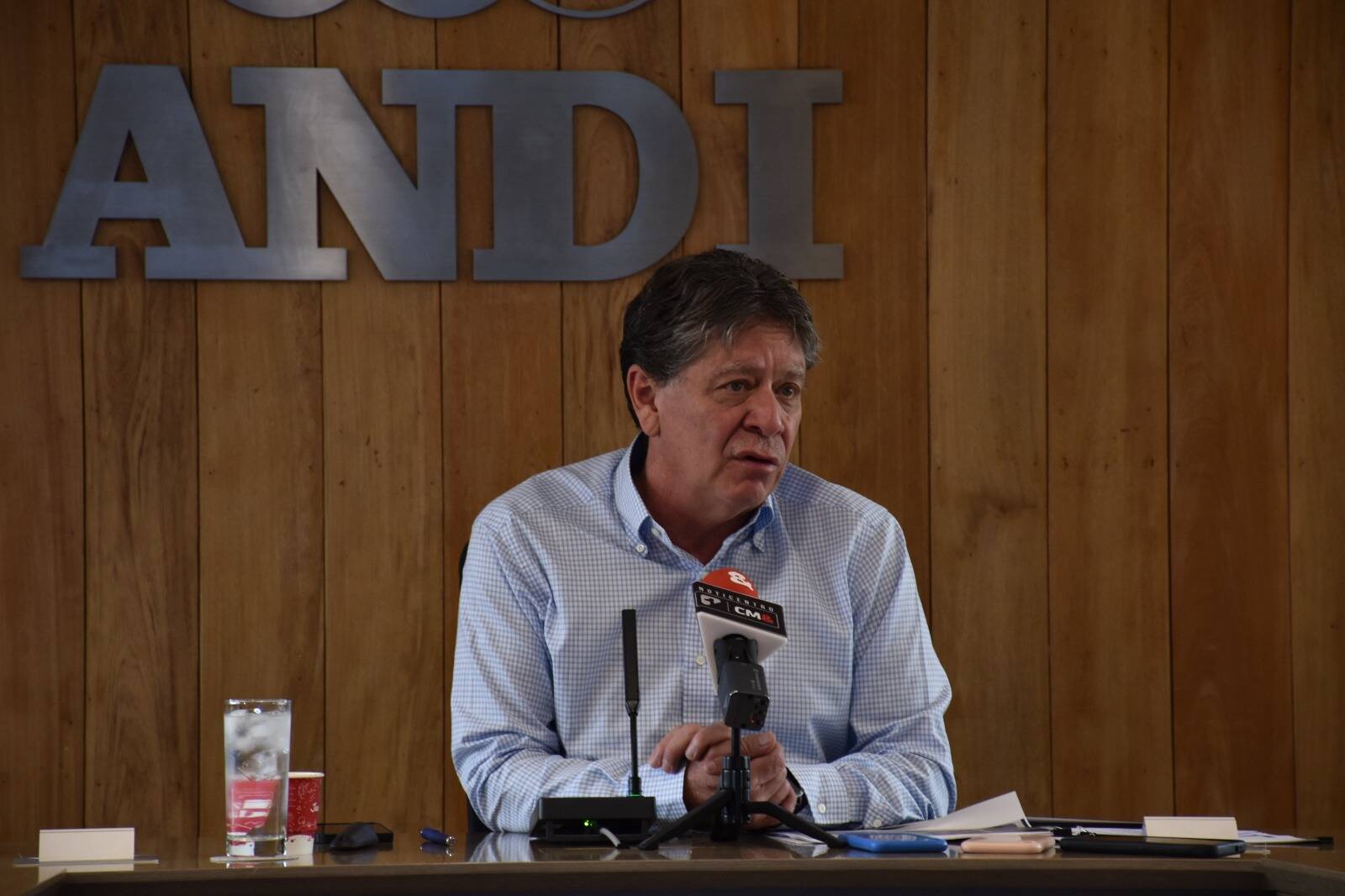Business owners accept changes to night and Sunday surcharges under labor reform: this is their proposal

Two months after being defeated, the labor reform bill, which seeks to provide more benefits to formal workers but would increase business costs, will be debated again this week in Congress.
In an interview with EL TIEMPO, Bruce Mac Master, president of the National Association of Businessmen of Colombia (Andi), proposes reaching an agreement on the most sensitive issues, such as night, Sunday, and holiday surcharges.
He affirms that they are willing to assume these costs and make "an immense effort" amid the difficult situation the country is experiencing. However, he requests that a special regime be established for small businesses and that the changes be implemented gradually.

Bruce MacMaster, president of Andi. Photo: Courtesy of Andi
Its return to Congress is good news. First, because this is the setting in which these kinds of decisions can be made. Second, because it's an opportunity to return to the last of the proposals we had made to the government, to sit down and discuss a reform. The last interaction we had with the Minister of Labor (Antonio Sanguino) was days before the bill was voted on in the Senate's Seventh Committee, where we had proposed that we sit down and discuss it together. However, the government responded that it wasn't interested and the next day announced it was pursuing a referendum. I think this is an opportunity to return to that point in the conversation.
From the outside, there was a perception that they were against it, wasn't there? No, in fact, what we always asked for was consensus. That's why we went so far as to complain to the International Labor Organization (ILO) and demand that the government activate tripartite mechanisms. The arrival of the new minister gave us great hope because in the conversations we had with him, he seemed very open. With Minister Gloria Inés Ramírez, the conversation had always been very complex because there was very little room for negotiation.
So will they now propose a new agreement? What we want is to ask Congress and the Government to be willing to move the reform forward. It's true that we've made very strong observations about the lack of decisions regarding unemployment and informality. However, we understand the current situation and think we should focus next week on working on the most sensitive issues, such as the night and Sunday surcharges. One possible way to achieve quick, very concrete results is to focus on the issues raised in the draft referendum.
Would you be willing to support the night surcharge starting at 7 p.m. and 100% pay for Sundays and holidays? Yes, despite the fact that we are aware of the immense cost that a large number of companies currently facing other tax or energy bill problems would have to bear. The situation is not easy, and the economy is not growing at a high rate. We have a specific proposal: an exceptional regime for micro and small companies and the restaurant, hotel, retail, and security sectors, which would be the most affected. We also propose a differentiation between holidays and Sundays, and that everything be done gradually starting in 2027, because the reduction in the workday is currently being implemented. This year we have 46 hours, and in July we will drop to 44. I call on business owners to join us in this decision, knowing that many organizations will have to make an immense effort.

The referendum collapses, and labor reform is revived in a heated session in Congress. Photo: Néstor Gómez. EL TIEMPO
I would say that it will be costly for businesses to take these measures, but it is true that these have always been major players in development and intend to remain so. We are willing to make this effort with the commitment that the country as a whole will very quickly seek mechanisms that allow us to maintain competitiveness. It is a call for the productive sector to truly be considered the major player in the economy alongside workers and not to be permanently attacked or stigmatized. At this moment in national and international reality, and in order to reduce the polarization and tensions we are experiencing, as occurred this week in Congress, I would say yes, this is an invitation for business leaders to act with generosity and national spirit and make this effort to commit to the country.
And what are the points of the reform that would be non-negotiable for you? I believe that fortunately, several points related to collective rights were withdrawn. These undoubtedly caused significant distortions for employers. Furthermore, there are still some doubts about the conditions under which employment contracts can be terminated, which greatly reduces companies' flexibility. I would also say that collective agreements end up being extremely useful for workers to talk with employers, and that we must seek to address the issue of SENA apprentices with special contracts to encourage the hiring of young people, because otherwise, we will end up being so strict that we would effectively eliminate all those possibilities.
He says the issue of SENA apprentices could have the opposite effect. Would you be willing to support this measure? We believe it must be studied in great detail to ensure the best possible compensation for them and avoid disincentives for employers. We must find a way for companies to always consider hiring apprentices as the natural option, and we should try to work on a contract that allows employers to always prioritize hiring these young people so as not to generate the opposite effect.
What impact do you estimate this reform could have on employment and informality? The last exercise we saw had a significant impact, with nearly half a million jobs potentially lost. We would have to undertake a huge task to try to monitor this impact accurately. If we focus on this work, we will be achieving something the consultation failed to do: making real, concrete decisions very soon.

Bruce Mac Master, president of Andi Photo: El Tiempo / courtesy
This has been our main priority. It will be difficult to include it now, among other things, because it wasn't previously discussed in the Chamber. What we should do is reach a broad national agreement to address these issues and understand and recognize that this is the country's biggest labor problem. Six out of 10 workers are informal. Colombia has a long way to go in terms of achieving broad formalization.
This week it was announced that the economy grew 2.7 percent in the first quarter, but several sectors, such as mining and quarrying and construction, are still in the red. What actions are needed? The 2.7 percent growth is better than the previous 0.3 percent figure; however, it is still a limited increase, and there are several lagging sectors that should be boosted. It should be noted that this year, Easter fell in April, and we will see its effect. Furthermore, something very notable is that this result is accompanied by the great blessing of the coffee boom we are experiencing. Not only has there been growth in exports, but also in demand. The more than 550,000 coffee-growing families are driving the economy. This sector alone grew 31 percent. Without this figure, we would have had a poor record. Fortunately, the coffee sector was well prepared to take advantage of the boom and that the institutional framework worked. Fortunately, all the renewal and fertilization programs that were intended were implemented, because this was in doubt a couple of years ago. Fortunately, the National Federation of Coffee Growers strengthened and knew how to react.
Another major topic of the week was Colombia's signing of its accession to China's Silk Road. What risks do you see on this front? Colombia must truly have a clear strategy, not only ideological but also productive and commercial, that determines which markets we can reach, how to do so, and which economies are willing to buy our products. We have asked this not only of this government, but of the previous one as well. Given what is happening internationally, the strategy must consider the entire dynamic currently taking place in the global market, keeping in mind that the United States is our largest market, that we export nearly 30 percent of our products there, and that we are capable of sending a significant amount of manufactured products with industrial content and added value. It is not worth putting that relationship at risk.
And wouldn't we have the possibility to explore new markets? There will be those who say we have the opportunity, and I believe that exploration must be undertaken. However, exploring the market is one thing, and potentially provoking our main allies is another. I think we may be making an unnecessary mistake that could end up being very costly. We've already seen the United States produce the first reactions, something we had warned about in some way. We have to ensure that our major trading partner is comfortable with us so that there is an increasingly favorable exchange.

Port of Cartagena Photo:
We always considered it a major diplomatic and strategic error to try to open a market that wasn't open to us. We all know that China isn't going to buy industrial products from us. Currently, it buys food from Brazil and mainly copper from Chile. The intentions we've seen from them to buy from us aren't impressive. The idea came up that we could sell them rice and onions, and the truth is, we all know that Colombian rice productivity levels don't allow us to export the product to China in any significant quantities. Furthermore, onions probably won't be an important part of our overall export portfolio. I think we're very lost in terms of international trade. I don't see many opportunities there.
Speaking of the United States, are you still taking steps to eliminate the 10 percent tariff imposed on Colombian products? The request we made to the Latin American delegate is that we find a way to reduce this tariff because it puts us at a huge disadvantage, compared to countries like Mexico, for example. Without a doubt, we must try to reduce it, but to do so, we need to take actions that allow us to build trust between the two economies.
eltiempo




